Coffee+tea lasts longer!
Original Swagpp mace medicine
Tea and coffee are two of the most widely consumed beverages in the world-
Tea is the second largest beverage in the world after water. About 3 billion people in the world like to drink tea, and basically one in every three people likes to drink tea. How much do you like coffee? According to the statistics of Science, the world consumes an average of 2.25 billion cups of coffee every day, and the cups can simply circle the earth 7.5 times!
Tea containing caffeine, catechin polyphenols and flavonoids has neuroprotective effects, and has the effects of anti-oxidative stress, anti-inflammation and anti-apoptosis. Coffee contains caffeine, which is also a rich source of antioxidants and bioactive compounds. Compared with milk tea, fruit juice, sugary drinks and so on, coffee and tea have naturally become the public’s first choice.
For working "dogs", having coffee and afternoon tea in the morning is really for "continuing life". But have you ever thought that while refreshing your mind, maybe coffee and tea are really helping you continue your life!
The latest research on West China of Sichuan University;
Drink 3 cups of tea or 6-8g of tea every day.
The anti-aging effect is the most obvious.
Tea contains a variety of bioactive substances, among which tea polyphenols are the most concerned. Previous studies have shown that tea polyphenols have anti-oxidation, anti-inflammatory, inhibiting cell apoptosis and regulating epigenetic changes, thus delaying the occurrence of aging. At the same time, animal experiments show that flavonoids and polyphenols rich in tea can prolong the life of worms, fruit flies and mice.
So, can people who drink more tea live longer?
Recently, a research team from West China School of Public Health of Sichuan University found that moderate tea drinking can delay the growth of human biological age. Among them, drinking about 3 cups of tea a day, or 6-8g of tea, has a particularly obvious anti-aging effect. The research was published in Lancet Regional Health-Western Pacific, a sub-journal of The Lancet.
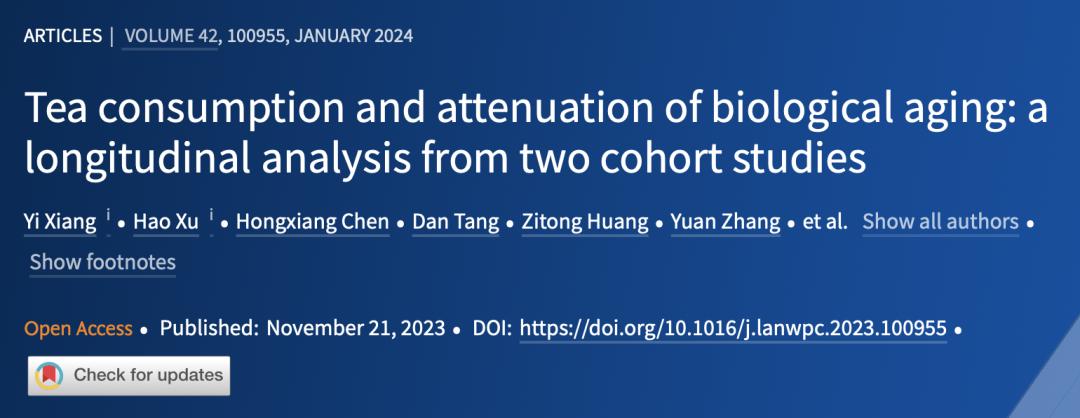
https://doi.org/10.1016/j.lanwpc.2023.100955
The researchers recruited 7931 participants from the China Multi-Ethnic Cohort (CMEC) and 5998 participants from the longitudinal cohort of the British Biological Database (UKB), and estimated their biological ages (BA) by using composite biomarkers and Klemera Doubal method (KDM).
What is the concept of KDM-BA acceleration? The multivariable adjustment model shows that the death risk will increase by 56% every year when the acceleration of KDM-BA increases. In addition, KDM-BA acceleration has a good performance in predicting most elderly-related diseases, such as cardiovascular disease, diabetes and weakness.
There are many kinds of tea covered in this survey, including green tea, scented tea, black tea, sweet tea, black tea, oolong tea, yellow tea and white tea. According to different frequency of drinking tea, participants were divided into three groups: no drinking at present, 1-2 days/week, 3-5 days/week and almost every day. And according to every 200ml as a standard cup, the daily tea consumption of participants was calculated.
What is very innovative is that when people in China drink tea, it is often in bulk rather than in bags. Therefore, the researchers specially measured the amount of tea (in grams) when collecting data.
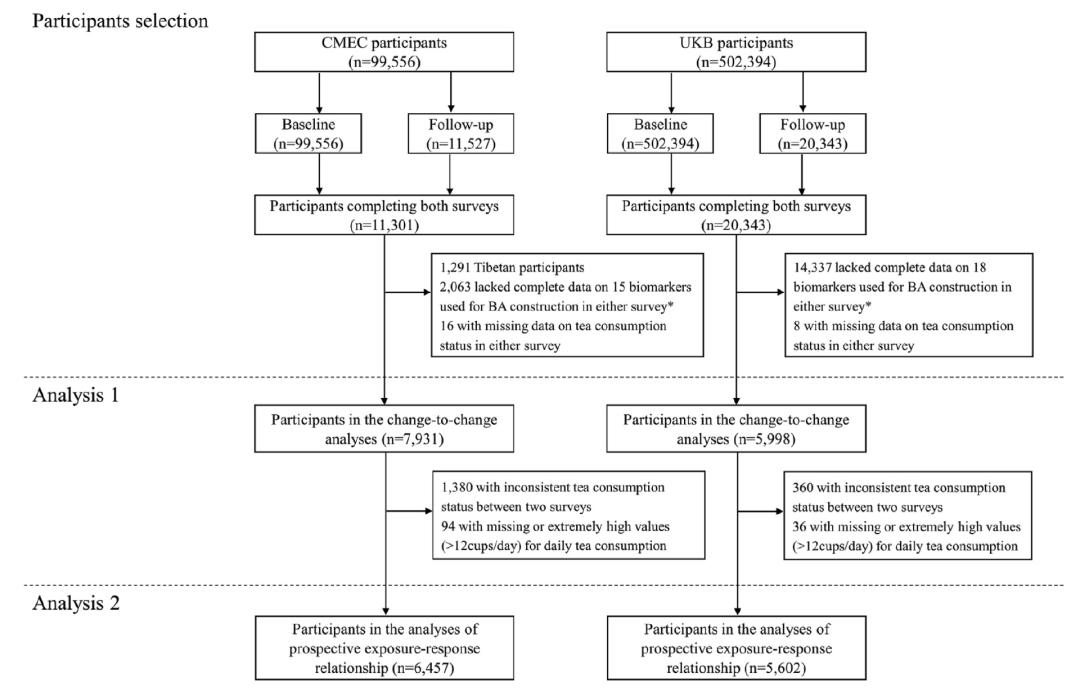
Research flow chart
In the whole queue, participants who insisted on drinking tea had a lower aging rate.
Specifically, compared with those who never drink tea, participants who change from drinking tea to drinking tea and insist on drinking tea have a slower increase in KDM-BA acceleration, which is simply "aging more slowly".
It was observed in the CMEC cohort that participants who changed from drinking tea to drinking tea had lower KDM-BA acceleration (β = ?0.319, 95% CI: ?0.620 to 0.017) than those who had no habit of drinking tea.
On the other hand, compared with those who have always had the habit of drinking tea, the acceleration of KDM-BA of participants who changed from drinking tea to not drinking tea increased more, that is, they aged faster.
According to the basic information collected, most of the participants who insist on drinking tea are men, who love drinking more and will maintain healthier eating habits. In addition, these participants are less likely to suffer from insomnia, depression and anxiety, especially in CMEC.
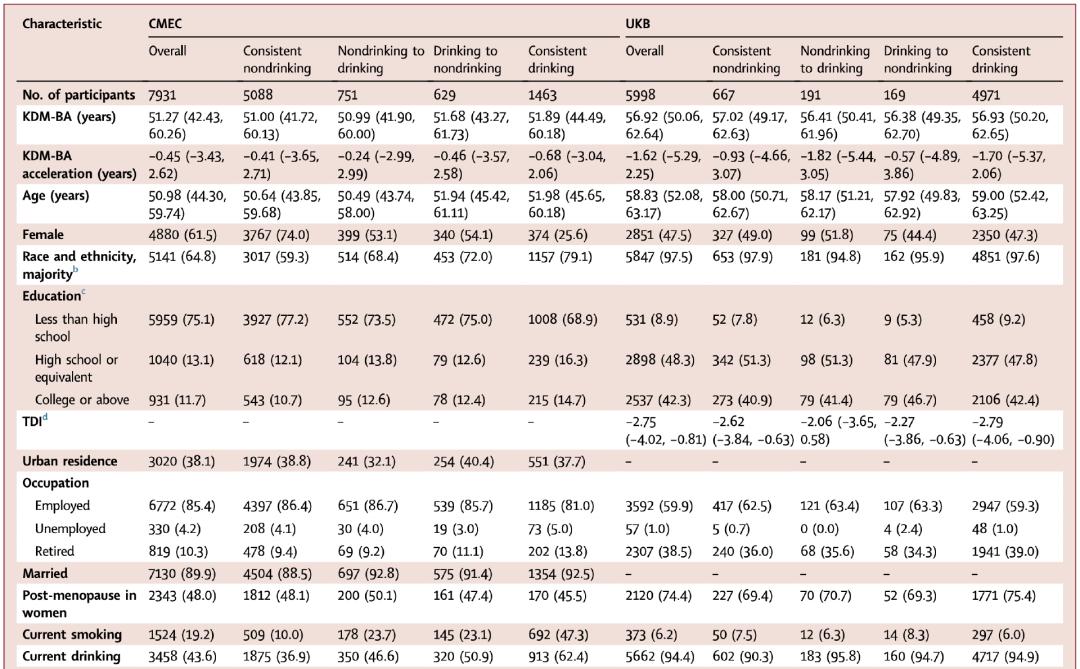
Basic information of participants
In order to get more practical conclusions, the researchers evaluated the prospective exposure-response relationship between tea drinking and biological age. Restricted cubic spline shows that with the increase of daily tea consumption, the curve of KDM-BA acceleration decreases continuously until 3 cups/day tends to be flat.
In other words, compared with those who don’t drink tea, participants who insist on drinking 2-3 cups of tea every day have the lowest KDM-BA acceleration. When the amount of tea leaves is taken as the exposure of CMEC, drinking 6-8g of tea leaves every day shows the strongest correlation, that is, the aging speed is the lowest at this time.
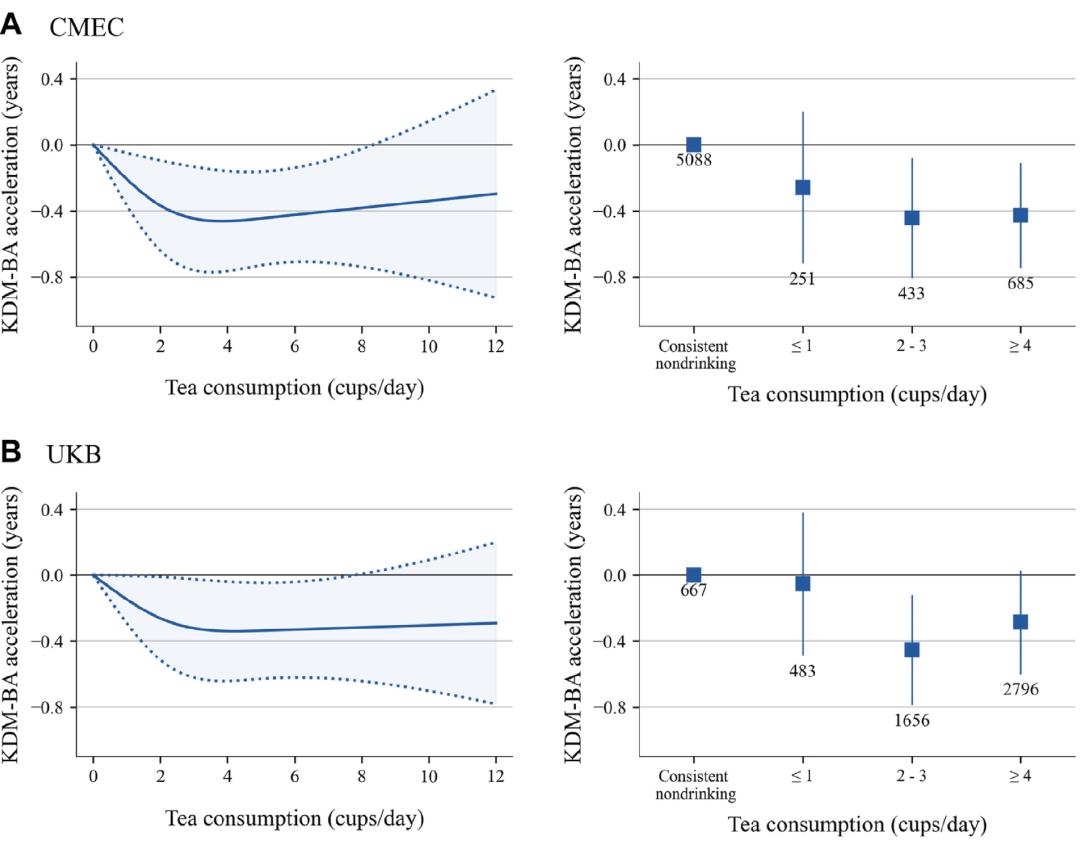
Correlation between tea consumption and KDM-BA acceleration
To sum up, there is a close relationship between drinking tea and the decline of biological aging acceleration measured by KDM-BA-the dose-response relationship shows that drinking 3 cups of tea or 6-8g of tea every day can maximize the anti-aging benefits.
It’s the first time that a study has made it so intimate that the grams of tea should be used every day! Why don’t you drink up? !
Drink 0.5-3 cups of coffee every day.
All-cause mortality fell by 12%
But instant coffee is really not good …
The benefits of coffee need not be said. In addition to refreshing, drinking coffee regularly is beneficial to reduce the risk of cancer and type 2 diabetes, control weight, improve depression, and prevent Parkinson’s disease and Alzheimer’s disease. Not only that, recent studies have shown that coffee can also reduce the risk of death, thus prolonging life!
A study published in the European Journal of Preventive Cardiology points out that drinking 0.5-3 cups of coffee a day is related to a 12% decrease in all-cause mortality and a 17% decrease in cardiovascular mortality. Compared with people who don’t drink coffee, coffee stars have better cardiovascular health; But the benefits are decaffeinated coffee and ground coffee, and have nothing to do with instant coffee … …

doi:10.1093/eurjpc/zwac008
The study recruited 468,629 volunteers from British Biobank. These volunteers had no previous history of cardiovascular diseases, with an average age of 56.2 8.1 years, accounting for 44.2% of men, and the average follow-up period was 11(10-12) years.
Among nearly 470,000 volunteers, 22.1% have no habit of drinking coffee, 58.4% drink 0.5-3 cups of coffee every day on average, and 19.5% drink more than 3 cups of coffee every day on average.
The analysis of multivariate Cox proportional hazard regression model shows that compared with people who don’t drink coffee, people who drink 0.5-3 cups of coffee a day have a 12% reduction in all-cause death risk; The risk of cardiovascular death decreased by 17%, and the risk of stroke decreased by 21%.
However, people who drink more than three cups of coffee a day have no obvious improvement compared with those who have no coffee habit. In other words, although drinking coffee often is good for health, it is not the more the better. 0.5-3 cups a day is the best dose of coffee for life.
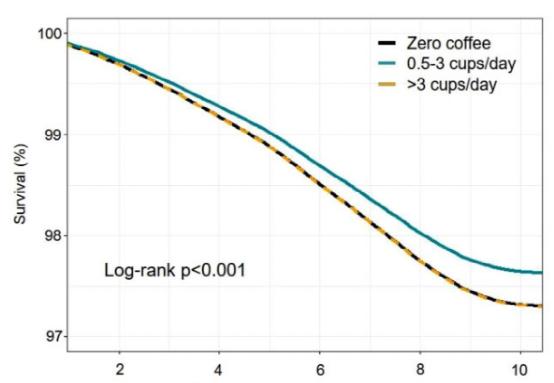
Relationship between coffee consumption and death risk
Next, the highlight of this study came-the researchers deliberately distinguished the health effects of different types of coffee.
Of all the volunteers who drink coffee, 19.5% are used to drinking decaffeinated coffee, 23.3% are used to drinking ground coffee and 55.1% are used to drinking instant coffee. After adjusting for possible confounding factors, the researchers found that compared with people who don’t drink coffee:
People who drink 0.5-3 cups of coffee every day have a 16% reduction in all-cause death risk (P = 0.001).
The risk of all-cause death decreased by 17% when drinking more than 3 cups of coffee every day (P = 0.022).
0.5-3 cups of ground coffee per day reduced the risk of all-cause death by 25% and cardiovascular death by 25% (P < 0.001).
What is even more shocking is that drinking more than 3 cups of ground coffee a day is associated with a 49% reduction in the risk of cardiovascular death (P=0.008)!
Compared with people who don’t drink coffee, many cardiac function parameters of volunteers who drink coffee without reason and ground coffee are improved. Unfortunately, the researchers found no evidence that drinking instant coffee for a long time can improve cardiovascular health.
The reason why different kinds of coffee have different health effects may be that they have gone through different processing processes and contain different chemical components. For example, although decaffeinated coffee does not contain caffeine, drinking decaffeinated coffee also helps to improve cardiovascular health and reduce the risk of death, indicating that other coffee ingredients besides caffeine are also beneficial to health.
To sum up, this study confirmed that 0.5-3 cups of coffee a day is helpful to improve cardiovascular health and reduce the risk of cardiovascular death and all-cause death. If possible, you can choose decaffeinated coffee and ground coffee!
Coffee+tea doubles the effect.
Drink enough of this amount
The risk of death is reduced by 22%
For most people, drinking tea or coffee is not a single thing, but both. So, what kind of sparks will tea and coffee collide?
Scholars from Tianjin Medical University have answered this long-standing question. They found that drinking coffee and tea in moderation every day can reduce the risk of death. Compared with people who don’t drink coffee or tea, participants who drink 2-4 cups of tea and < 1-2 cups of coffee a day have a lower risk of all-cause death, cardiovascular disease death and respiratory disease death.
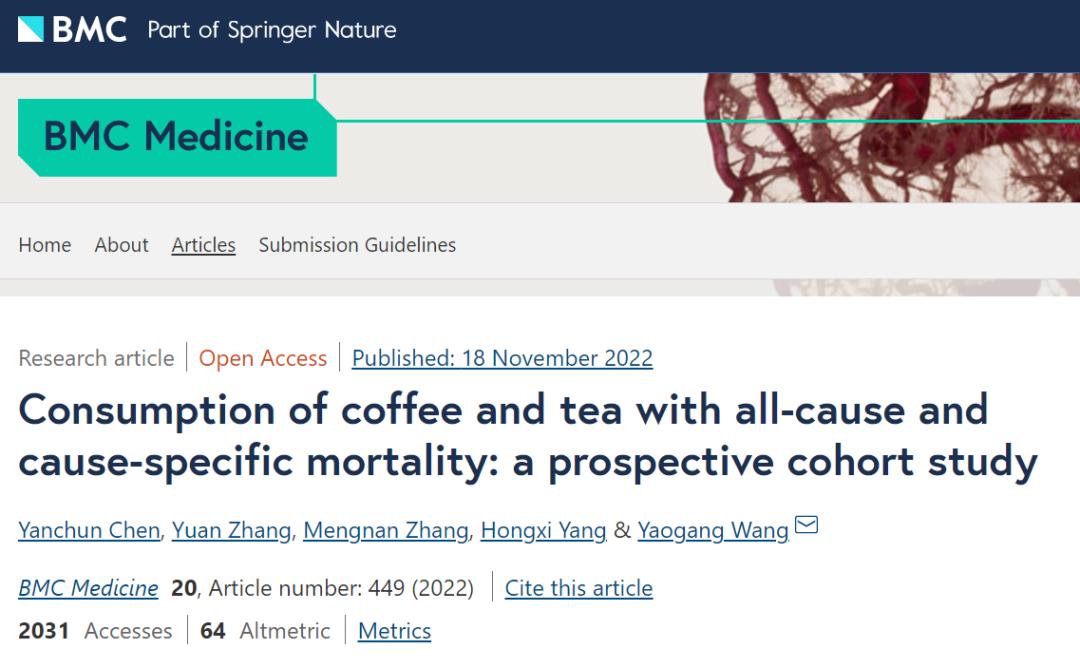
(Source: BMC Medicine)
Using longitudinal cohort data of nearly 500,000 people from British Biobank, this study analyzed the relationship between coffee and tea drinking alone or in combination and total mortality and specific cause mortality (including cardiovascular diseases, respiratory diseases and digestive diseases).
First, the researchers investigated the relationship between drinking only coffee or tea every day and mortality. Surprisingly, only drinking coffee or tea has a nonlinear relationship with mortality. Among them, there is a J-type correlation between drinking only coffee and all-cause, cardiovascular disease and respiratory disease mortality, while drinking only tea is an anti-J-type correlation between all-cause and cardiovascular disease mortality; There is a consistent anti-J correlation between drinking only coffee or tea and mortality of digestive diseases.
Specifically, drinking 1 cup of coffee or 3 cups of tea a day has the lowest risk of all-cause death, while drinking about 5 cups of coffee or 6 cups of tea a day has the lowest risk of death from digestive diseases.
* Xiaobian Google learned that the UK 1 cup=250 mL.
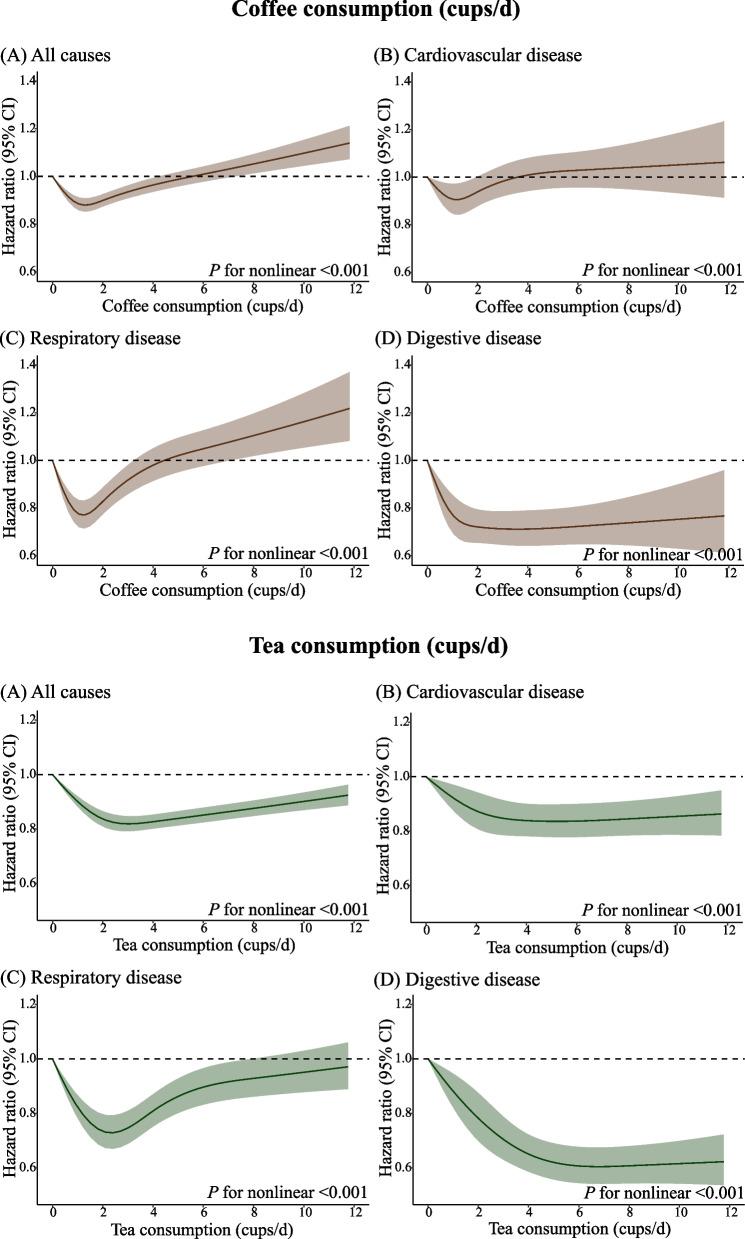
Correlation curve between drinking coffee or tea and all-cause mortality and specific cause mortality
(Source: BMC Medicine)
Then, the author further quantified the relationship between the consumption of coffee and tea and the mortality rate. Participants were divided into two groups according to their coffee intake (none, < 1~2, 3~4 and ≥5 cups/day) and tea intake (none, < 1~1, 2~4 and ≥5 cups/day), and their all-cause mortality and specific cause mortality were counted.
The analysis results show that compared with participants with different drinking amounts in the same group, participants who drink 2-4 cups of tea or < 1-2 cups of coffee every day have the lowest mortality rate from all causes, cardiovascular diseases and respiratory diseases.

All-cause mortality drinking coffee or tea (Source: BMC Medicine)
Great, it seems that the benefits of drinking coffee or tea are double-edged, which can actually reduce the mortality rate! Coffee star people and tea star people expressed great satisfaction. Not only that, the researchers also "humanized" the friends who love "the combination of Chinese and western" and analyzed the joint drinking of coffee and tea.
So, is drinking coffee and tea together a "happy takeoff" or a "full of harm"?
Surprisingly, the results show that there is a significant interaction between the co-drinking of coffee and tea and all-cause mortality. For those who drink a little coffee every day, the all-cause mortality increases with the increase of tea intake, but for those who drink a lot of coffee every day, the relationship is U-shaped. However, for people who drink tea every day, no matter how much they drink, the increase of their coffee intake is related to all-cause mortality in a U-shape.
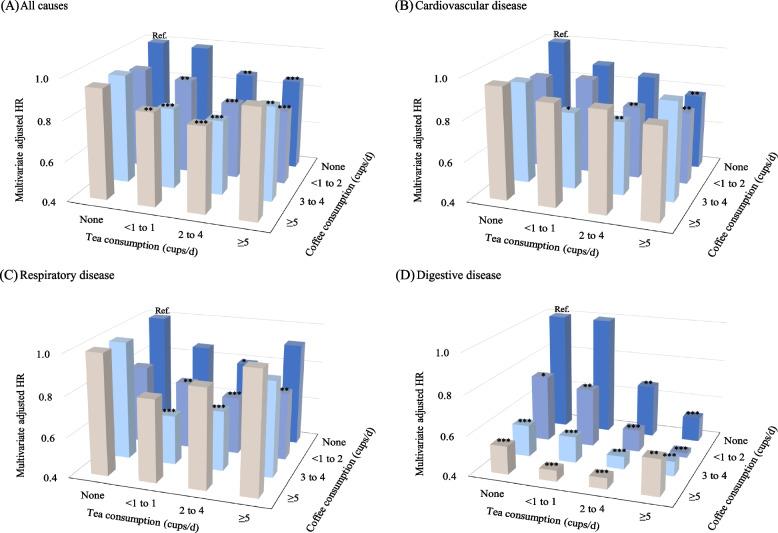
Drinking coffee and tea is combined with all-cause and specific-cause mortality.
(Source: BMC Medicine)
As a result, the researcher draws a data conclusion that can make the majority of migrant workers "ecstatic": compared with those who don’t drink coffee and tea, drinking < 1~2 cups of coffee +2~4 cups of tea every day can reduce people’s risk of all-cause death by 22%, CVD risk by 24% and respiratory disease death risk by 31%!
So, everyone here, warm winter, would you choose poetic tea or romantic coffee? Let’s drink both together!
References:
[1]Simon J, Fung K, Raisi-Estabragh Z, et al. Light to moderate coffee consumption is associated with lower risk of death: a UK Biobank study. Eur J Prev Cardiol. 2022; 29(6):982-991. doi:10.1093/eurjpc/zwac008
[2]Xiang Y, Xu H, Chen H, Tang D, Huang Z, Zhang Y, Wang Z, Wang Z, Yangla, Han M, Yin J, Xiao X, Zhao X. Tea consumption and attenuation of biological aging: a longitudinal analysis from two cohort studies. Lancet Reg Health West Pac. 2023 Nov 22; 42:100955. doi: 10.1016/j.lanwpc.2023.100955. PMID: 38075587; PMCID: PMC10700389.
[3] Chen Y, Zhang Y, Zhang M, Yang H, Wang Y. Consumption of coffee and tea with all-cause and cause-specific mortality: a prospective cohort study. BMC Med. 2022 Nov 18; 20(1):449. doi: 10.1186/s12916-022-02636-2. PMID: 36397104; PMCID: PMC9673438.
Writing | Swagpp
Edit | Swagpp
●●●● Copyright: MedSci is a leading medical research and academic service platform in China, which is committed to improving medical quality, providing intelligent and accurate decision support for clinical practice, and benefiting doctors and patients. Individuals are welcome to forward to the circle of friends, and media or institutions are not allowed to reprint to other platforms in any form without authorization.
Original title: "Coffee+tea lasts longer! The latest in West China of Sichuan University: Drinking 3 cups of tea every day has the best anti-aging effect! The risk of death from drinking coffee decreases by 22%.
Read the original text